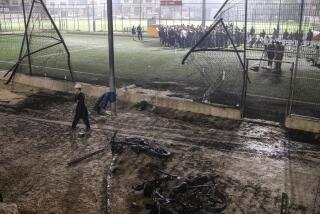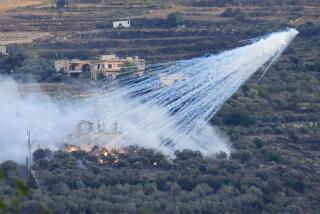Syria probably dropped chlorine gas on civilians, rights group says
- Share via
The Syrian government probably used chlorine gas on civilian populations on five occasions in April, a rights group said Tuesday.
Human Rights Watch has gathered evidence that it says strongly suggests the government has embedded canisters of chlorine inside oil drums full of explosives, which it dropped from helicopters on three opposition-held towns in northern Syria.
At least 11 people were reported killed in the attacks, and about 500 others suffered apparent effects of gas exposure, witnesses told the rights group.
The findings are based on interviews with witnesses, including medical personnel, video footage of the attacks and photographs of the canister remnants.
Witnesses said they saw or heard a helicopter dropping a barrel bomb followed by an odor they likened to household cleaners. The explosions produced “yellow smoke” or “dark yellowish smoke,” witnesses told the rights group.
Chlorine gas is yellow-green and has a pungent and irritating odor, according to the U.S. Centers for Disease Control and Prevention.
One video citied by Human Rights Watch is said to be from an April 11 attack on the town of Kfar Zeita, in Hama province, and shows the moment of impact and explosion of one of the bombs. Seconds later, a yellow patch can be seen forming at the base of the large gray and white cloud.
Only the government has deployed helicopters and other aircraft during the ongoing conflict, the rights group said.
Reports of the chlorine attacks came as the Syrian government neared completion of its handover of chemical stockpiles, after it missed an April 27 deadline. Chlorine is not on the list of toxic chemicals being removed from the country.
But using an industrial chemical as a weapon would still violate the international treaty prohibiting chemical weapons that Syria joined in October 2013 as part of a deal to avoid U.S. airstrikes on military targets.
The Organization for the Prohibition of Chemical Weapons, which is overseeing the removal of the weapons from Syria, announced in late April a mission to investigate the allegations of chlorine attacks. The government, which has blamed rebels for the chlorine attacks, has agreed to accept the mission and provide security for areas under its control.
“Syria’s apparent use of chlorine gas as a weapon – not to mention targeting of civilians – is a plain violation of international law,” said Nadim Houry, deputy Middle East and North Africa director at Human Rights Watch. “This is one more reason for the U.N. Security Council to refer the situation in Syria to the International Criminal Court.”
More to Read
Sign up for Essential California
The most important California stories and recommendations in your inbox every morning.
You may occasionally receive promotional content from the Los Angeles Times.














